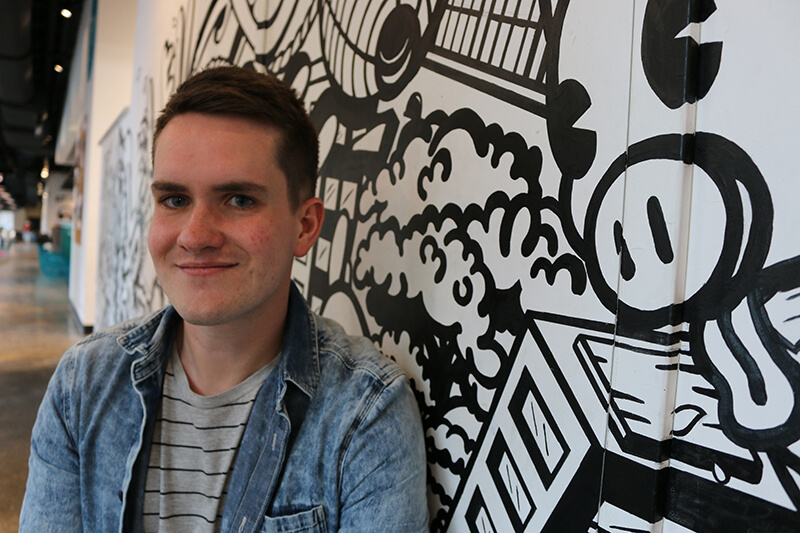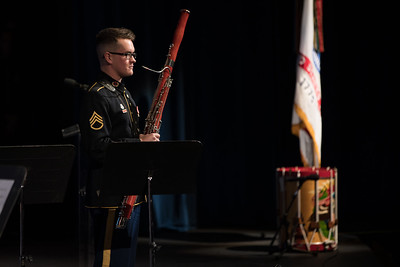Connecting Americans through music
Connecting Americans through music
Meet Washington D.C.-based alumnus Randy Fultz ’17E, ’19E (MM)
When Randy Fultz ’17E, ’19E (MM) was preparing to graduate from his master’s program at Eastman, he did not expect to be in basic combat training whilst studying for exams. Fultz, who is now based in Washington, D.C. playing with the United States Army Field Band, reflects on his journey.

How did your experience at Eastman School of Music influence your life today?
My six years at Eastman deeply impacted my life. Between my two degrees, by the time I left Rochester I had spent exactly a quarter of my life on Gibbs Street. I learned so many lessons on how to balance life, work, and musical progress, as well as gained endless inspiration from my teachers and my peers. I fully credit Eastman with molding me into the artist I am today. I’m also thankful for the intensity of the workload Eastman regularly exposed me too; balancing practice, homework, part time jobs, and time with friends was great practice for balancing adult life in the professional world.
How did you come to join the United States Army Field Band?
During my master’s program at Eastman, I was very fortunate to land my position with the United States Army Field Band. By the time I won my spot, I’d already taken around 10 auditions for professional ensembles over two years; I was so close to being burned out and temporarily calling it quits. The Field Band audition took place in January, and the next thing I knew life changed dramatically; I found myself preparing for a degree recital, final exams, graduation, and basic combat training! The rest of the semester was a blur filled with nostalgic moments with faculty and peers, as well as plenty of timed runs and endless pushups and pull-ups. At the end of it all, I essentially walked across the graduation stage and right on to a plane to Fort Leonard Wood, Missouri. I think I was so busy leading up to shipping out that I didn’t even have time to be nervous! After my three-month stint in Missouri, I got on a plane to the Baltimore-DC area and immediately got back to work making music. I only had about a month to relearn how to play the bassoon well enough to embark on a five weeklong concert tour; it was all a bit intense.
What is the most rewarding part about your position?
The mission of the United States Army Field Band is to connect America to its army, and our mode of doing that is through nationwide concert tours. The Field Band travels for about 100 days a year, through so many diverse communities: from bustling cities to tiny one-stoplight towns. When we get to perform in a nice hall in a larger city, that’s all well and great, but what I really love is when we play in some small backwoods community in a random high school gym. I grew up in a less privileged area of South Carolina, and there were very few opportunities to experience live symphonic music at such a high level.
Every time we play one of these small shows, I feel like I’m playing for my younger self; proving to any kids in the audience who love music that this kind of profession isn’t beyond their reach. If you practice hard, and seek out opportunities, they are out there for you; the Field Band helps me set that example.
What has been your favorite memory thus far with the band?
 Because of the pandemic I haven’t toured very extensively with the Field Band just yet, but my favorite memory so far comes to a tie. The first one is very recent, with our 4th of July concert in New York City. The Field Band was asked by Macy’s to perform for the big fireworks show along the East River; the camera crews, celebrities, and crowds of people made for a very memorable and fun night with my colleagues and was overall just a super cool gig. My second favorite memory comes from a smaller show we played just before the pandemic canceled our Spring 2020 tour. The band was performing in Richmond, Indiana, and a large portion of my extended family that lived in the area was able to attend the concert. We performed a transcription of Stravinsky’s Firebird Suite that night, and when I performed the bassoon solo, the entire back half of the audience erupted into applause from my family. It was the first time any of them had gotten to hear me play live since I was a high schooler, and they were all so excited! The memory still makes me smile.
Because of the pandemic I haven’t toured very extensively with the Field Band just yet, but my favorite memory so far comes to a tie. The first one is very recent, with our 4th of July concert in New York City. The Field Band was asked by Macy’s to perform for the big fireworks show along the East River; the camera crews, celebrities, and crowds of people made for a very memorable and fun night with my colleagues and was overall just a super cool gig. My second favorite memory comes from a smaller show we played just before the pandemic canceled our Spring 2020 tour. The band was performing in Richmond, Indiana, and a large portion of my extended family that lived in the area was able to attend the concert. We performed a transcription of Stravinsky’s Firebird Suite that night, and when I performed the bassoon solo, the entire back half of the audience erupted into applause from my family. It was the first time any of them had gotten to hear me play live since I was a high schooler, and they were all so excited! The memory still makes me smile.
What are you looking forward to next?
The Field Band has some great new projects coming up soon. Aside from plans to get back on the road for official tours again (southwestern friends, be on the lookout for Spring 2022), we have several smaller projects in the works to round out 2021. I’ll revisit one of my favorite parts of New York State when we go on a small run-out to perform at the Chautauqua Institution, and I’ll get to finally experience Chicago for the first time when we travel there in December to perform for clinicians at the Midwest Clinic.


